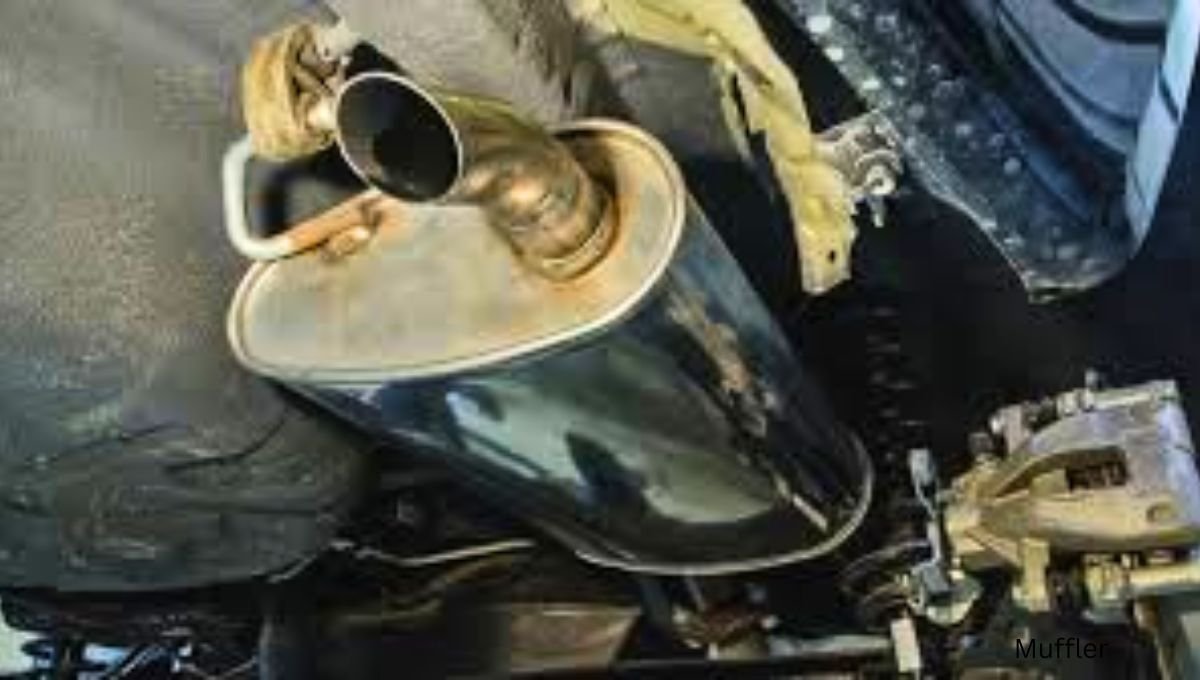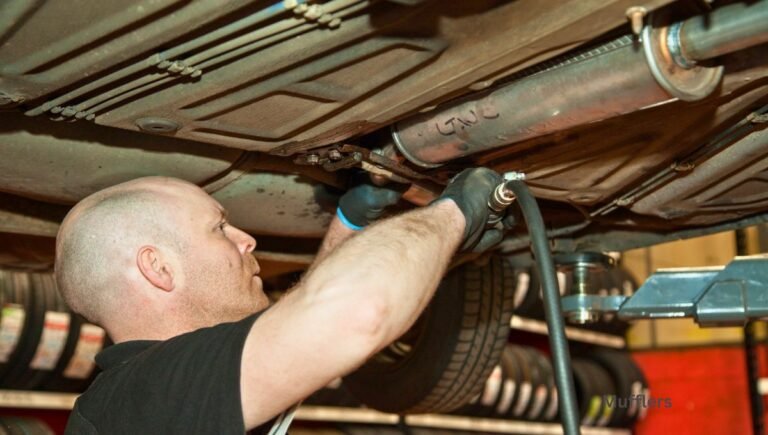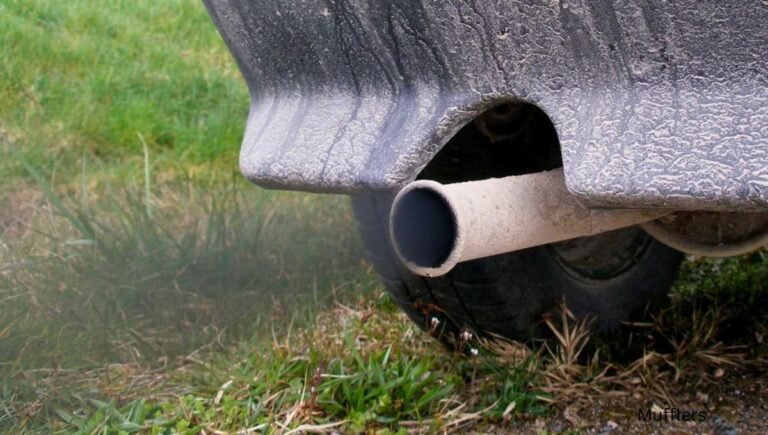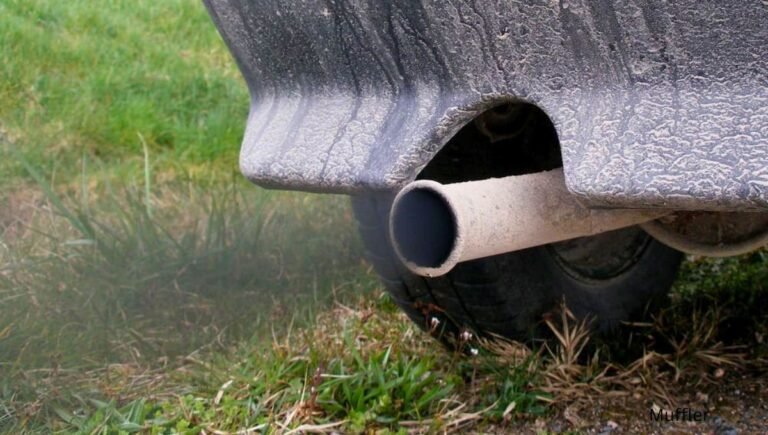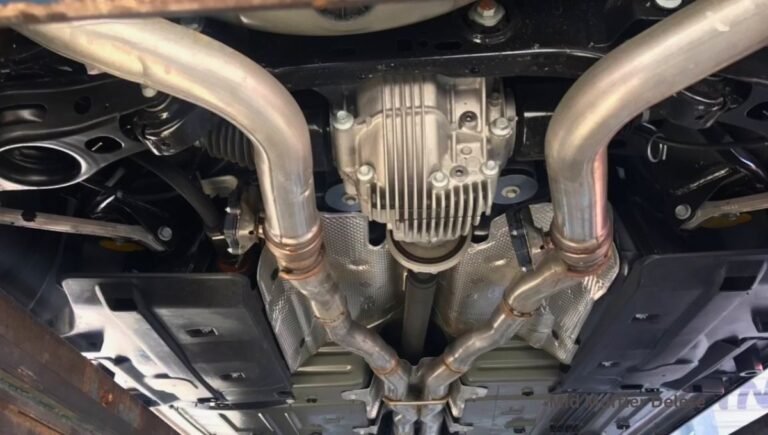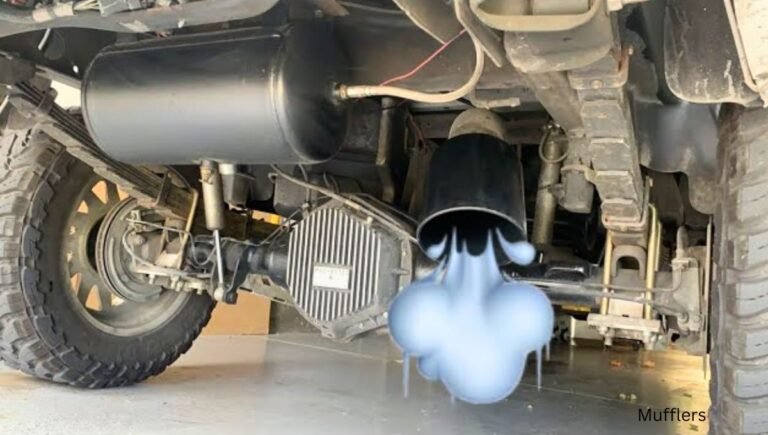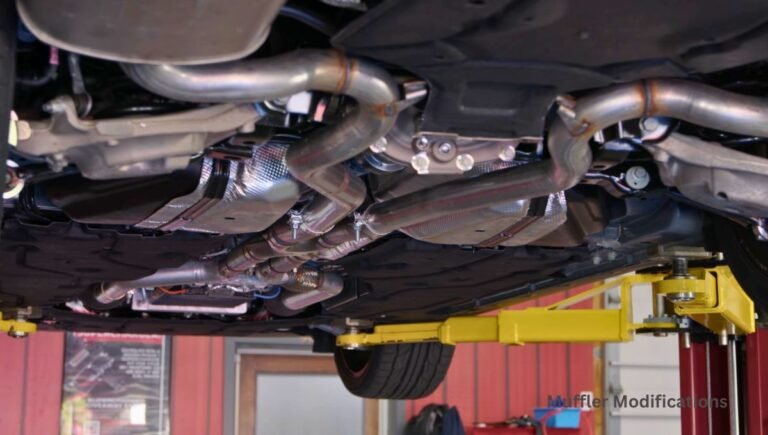How Long Can You Drive Without a Muffler? Risks & Tips
You can drive without a muffler for a short distance, but it is not recommended. Operating a vehicle without a muffler can lead to noise pollution and potential legal issues.
It is crucial to have a functioning muffler to reduce noise and ensure the proper functioning of your vehicle’s exhaust system. Driving without a muffler can also impact the performance of your car and may lead to increased emissions. In addition, a missing muffler can expose you and other drivers to harmful exhaust fumes.
It is best to address any muffler issues promptly to maintain a safe and efficient driving experience.
Introduction To Mufflers
The muffler is an essential component of a vehicle’s exhaust system, responsible for reducing the amount of noise emitted by the engine. In addition to noise reduction, it also plays a crucial role in directing exhaust gases away from the vehicle.

This blog post will explore the significance of mufflers in vehicle exhaust systems and the potential scenarios that can arise when a muffler is missing.
Role In Vehicle Exhaust Systems
The muffler is a vital part of a vehicle’s exhaust system, designed to reduce the noise produced by the engine. It achieves this by using various chambers and materials to absorb and reflect sound waves.
The muffler helps to direct exhaust gases away from the vehicle, preventing them from entering the passenger cabin and reducing the risk of harmful fumes accumulating inside the car. The efficient functioning of the muffler is essential for maintaining the overall performance and safety of the vehicle.
Potential Scenarios For Missing Mufflers
Driving a vehicle without a muffler can lead to several potential scenarios, including increased noise pollution, environmental concerns, and the risk of exposure to toxic fumes. Without a muffler to suppress the noise, the vehicle may produce excessively loud sounds, which can be disruptive to the driver, passengers, and surrounding individuals.
The absence of a muffler can result in the release of harmful emissions directly from the exhaust system, contributing to air pollution and environmental damage. Therefore, it is crucial to address any issues related to missing or malfunctioning mufflers promptly to ensure the overall safety and compliance of the vehicle.
Legal Considerations
While driving without a muffler may seem like a minor inconvenience, it can have legal ramifications. In this article, we’ll explore the legal considerations of driving without a muffler, including noise ordinances, emission laws, and state-specific vehicle codes.
Noise Ordinance
Most cities and towns have noise ordinances that limit the amount of noise a vehicle can produce. These ordinances are in place to protect the community from excessive noise pollution. When driving without a muffler, your vehicle is likely to produce noise levels that exceed these limits.
For example, in Los Angeles, California, the noise limit for vehicles is 95 decibels. If your vehicle exceeds this limit, you can be fined up to $250.
Emission Laws
In addition to noise ordinances, there are also emission laws that prohibit vehicles from producing excessive amounts of pollutants. When driving without a muffler, your vehicle is likely to produce higher levels of pollutants than it would with a muffler.
For example, in California, all vehicles are required to pass an emissions test before they can be registered. If your vehicle fails the test due to excessive emissions, you will need to make repairs before you can register it.
State-specific Vehicle Codes
Finally, it’s important to note that each state has its own vehicle code that outlines specific requirements for vehicles. These codes may include regulations related to mufflers and exhaust systems.
For example, in Texas, all vehicles are required to have a muffler that prevents excessive or unusual noise. If your vehicle does not have a muffler, you could be fined up to $250.
| State | Muffler Requirement | Fine for Driving Without a Muffler |
|---|---|---|
| California | All vehicles must have a muffler | Up to $250 |
| Texas | All vehicles must have a muffler | Up to $250 |
| Florida | All vehicles must have a muffler | Up to $1,000 |
Driving without a muffler may seem like a minor inconvenience, but it can have serious legal consequences. To avoid fines and other penalties, it’s important to make sure your vehicle is in compliance with all relevant laws and regulations.
Safety Concerns
Driving without a muffler can pose safety concerns due to increased noise levels and potential exhaust leaks. It is illegal in many areas and can lead to fines or vehicle impoundment. Regular muffler maintenance is crucial for safe and quiet driving.
Increased Risk Of Carbon Monoxide Poisoning
Driving without a muffler can increase the risk of carbon monoxide poisoning. Carbon monoxide is a colorless, odorless gas that can cause headaches, dizziness, nausea, and even death.
Without a muffler, the exhaust system is not able to filter out the harmful gases before they are released into the environment. As a result, these gases can enter the cabin of the vehicle, putting the driver and passengers at risk.
Potential For Burn Hazards
Another safety concern when driving without a muffler is the potential for burn hazards. The exhaust system on a vehicle can reach extremely high temperatures, up to 1,200 degrees Fahrenheit in some cases.
Without a muffler to dissipate the heat, the surrounding components of the vehicle, such as the undercarriage or nearby flammable materials, can become overheated and potentially ignite. This can lead to a dangerous situation for the driver and anyone else nearby.
It is important to address any issues with a muffler as soon as they arise to prevent these safety concerns. Regular maintenance and inspections of the exhaust system can help identify any potential problems before they become a hazard. If you do experience any issues with your muffler, it is recommended to have it repaired or replaced by a qualified mechanic as soon as possible.
Performance Implications
Driving without a muffler can lead to poor performance, increased noise, and potential legal issues. The absence of a muffler affects the exhaust system’s back pressure, resulting in reduced engine power and efficiency. Additionally, it can cause damage to other components due to increased heat and exhaust fumes.
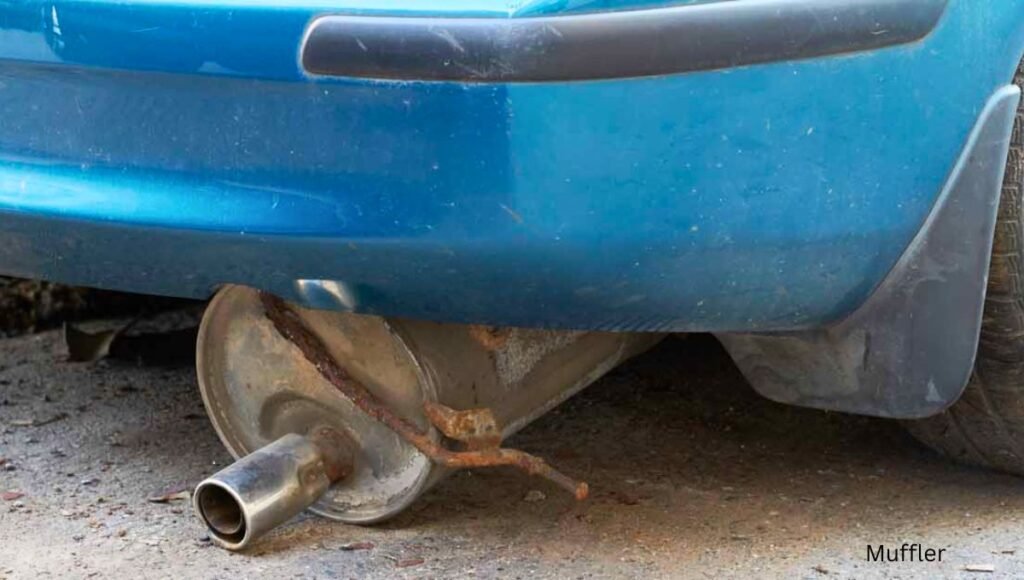
Effect On Engine Performance
When driving without a muffler, the engine’s performance can be significantly impacted. The muffler plays a crucial role in reducing the noise produced by the exhaust gases and improving the overall engine performance. Without a muffler, the engine’s performance can be negatively affected in multiple ways.
Firstly, the lack of a muffler can lead to a decrease in backpressure, which is the resistance in the exhaust system that helps optimize engine performance. Without backpressure, the engine may experience a loss of torque and power, resulting in reduced acceleration and overall performance.
Additionally, the absence of a muffler can cause the engine to produce a louder and more aggressive noise. While this may be appealing to some car enthusiasts, it is important to note that excessive noise can be a sign of inefficiency and potential damage to the engine. The increased noise can also affect the driver’s comfort and overall driving experience.
Impact On Fuel Efficiency
The lack of a muffler can also have a significant impact on fuel efficiency. The muffler is designed to help regulate the flow of exhaust gases and improve the overall efficiency of the engine. Without a muffler, the exhaust gases may not be properly channeled, leading to a disruption in the combustion process.
This disruption can result in a decrease in fuel efficiency, as the engine may not be able to effectively burn the fuel-air mixture. As a result, more fuel may be required to achieve the desired level of power and performance, leading to increased fuel consumption.
Furthermore, the absence of a muffler can also lead to a decrease in aerodynamic efficiency. The muffler helps streamline the flow of exhaust gases, reducing drag and improving the overall aerodynamics of the vehicle. Without a muffler, the vehicle may experience increased drag, requiring more energy to overcome resistance and maintain speed. This can further contribute to decreased fuel efficiency.
In conclusion, driving without a muffler can have significant performance implications on the engine and fuel efficiency. It is important to ensure that your vehicle is equipped with a properly functioning muffler to optimize engine performance, reduce noise levels, and maintain fuel efficiency.
Environmental Impact
Driving without a muffler can have a significant environmental impact. The loud noise produced by the vehicle can disturb wildlife, contribute to noise pollution in residential areas, and potentially harm the overall ecosystem. It is important to address muffler issues promptly to minimize the negative effects on the environment.
Driving without a muffler can have several negative consequences for the environment. The absence of a muffler can lead to increased air pollution and noise pollution. Let’s explore the environmental impact of driving without a muffler in more detail.
Consequences For Air Quality
Driving without a muffler can significantly contribute to air pollution. The muffler plays a crucial role in reducing harmful emissions from the vehicle’s exhaust system. Without a muffler, the exhaust gases are released directly into the atmosphere, increasing the levels of pollutants such as carbon monoxide, nitrogen oxides, and hydrocarbons.
These pollutants have detrimental effects on air quality and human health. Carbon monoxide, for example, is a poisonous gas that can impair oxygen delivery in the body, leading to headaches, dizziness, and even death in high concentrations. Nitrogen oxides and hydrocarbons contribute to the formation of smog and can cause respiratory problems.
Noise Pollution Issues
Driving without a muffler also results in increased noise pollution. The muffler plays a crucial role in reducing the noise produced by the engine and exhaust system. Without a muffler, the sound produced by the engine becomes much louder, disturbing the peace and tranquility of residential areas, workplaces, and natural habitats.
Excessive noise can have significant negative impacts on human health and well-being. Prolonged exposure to high levels of noise can lead to stress, sleep disturbances, hearing loss, and even cardiovascular problems. It can also disrupt wildlife habitats, affecting the behavior and communication of animals.
To summarize, driving without a muffler has a detrimental impact on both air quality and noise pollution. It contributes to increased levels of harmful emissions, compromising air quality and posing risks to human health. Additionally, the increased noise levels can disturb the peace and well-being of individuals and wildlife. It is essential to ensure that vehicles are equipped with a properly functioning muffler to minimize these environmental impacts.
Driving Experience
When driving without a muffler, you will notice various changes in your driving experience. These changes can affect the sound of your vehicle, as well as the vibrations and ride comfort. It’s important to understand what to expect when driving without a muffler.
Changes In Vehicle Sound
Driving without a muffler significantly alters the sound of your vehicle. The absence of a muffler allows the exhaust gases to exit the vehicle without any noise suppression, leading to a much louder and more aggressive engine sound.
This drastic increase in sound can be disruptive to both the driver and passengers, and may even draw unwanted attention from law enforcement due to the excessive noise levels.
Vibrations And Ride Comfort
The absence of a muffler can also lead to increased vibrations within the vehicle. Without the muffler’s dampening effect, the exhaust system may transmit more vibrations, causing a noticeable change in the ride comfort.
These vibrations can affect the overall driving experience, leading to discomfort for both the driver and passengers. Furthermore, the increased vibrations may also indicate potential issues with the exhaust system that require attention.
Short-term Vs Long-term
Driving without a muffler can have short-term benefits, such as increased engine performance and louder exhaust sounds. However, in the long-term, it can lead to engine damage, noise pollution, and potential fines for violating local laws. It is important to weigh the immediate advantages against the potential consequences before deciding to drive without a muffler.
Immediate Risks Of Driving Without A Muffler
Driving without a muffler can lead to excessive noise. The loud sounds can disturb others and even violate noise regulations. It can also attract unwanted attention from law enforcement.
Long-term Damage To The Vehicle
Exhaust gases can leak into the car’s cabin, posing a health risk. The lack of a muffler can lead to engine damage due to exposure to elements like rain and debris. Overall, driving without a muffler can result in costly repairs.
Preventative Measures And Tips
Regularly inspect muffler for signs of damage. Replace if necessary.
- Check for rust or holes in the muffler.
- Ensure the muffler is securely attached to the vehicle.
If muffler falls off while driving, pull over immediately.
- Use a metal can or aluminum foil as a temporary fix.
- Seek professional repair as soon as possible.
Professional Advice
Driving without a muffler can cause a lot of noise pollution and can be illegal in some places. It is recommended to get your muffler fixed as soon as possible to avoid any unwanted attention. Professional advice suggests not driving without a muffler for an extended period of time.
When To Seek A Mechanic
If the noise persists after a few days, it is best to consult a mechanic.
Costs And Repair Options
Repair costs vary depending on the extent of the damage and the type of vehicle.
Conclusion
Driving without a muffler can lead to serious consequences. It’s important to address any muffler issues promptly to avoid further damage. Regular maintenance and timely repairs are crucial for a safe and efficient driving experience. Don’t overlook the importance of a properly functioning muffler for your vehicle’s performance and your own safety.

